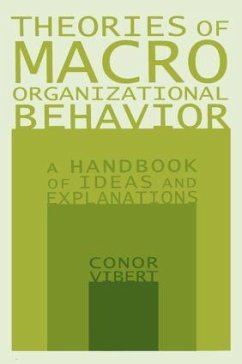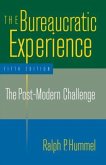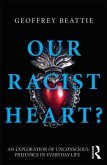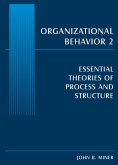Conor Vibert
Theories of Macro-Organizational Behavior: A Handbook of Ideas and Explanations
A Handbook of Ideas and Explanations
Conor Vibert
Theories of Macro-Organizational Behavior: A Handbook of Ideas and Explanations
A Handbook of Ideas and Explanations
- Broschiertes Buch
- Merkliste
- Auf die Merkliste
- Bewerten Bewerten
- Teilen
- Produkt teilen
- Produkterinnerung
- Produkterinnerung
This work provides a comprehensive summary of the major theories meant to explain the way business and other organizations work, why they look and act as they do and what makes some succeed and others fail.
Andere Kunden interessierten sich auch für
![The Bureaucratic Experience The Bureaucratic Experience]() Ralph P HummelThe Bureaucratic Experience94,99 €
Ralph P HummelThe Bureaucratic Experience94,99 €![Our Racist Heart? Our Racist Heart?]() Geoffrey BeattieOur Racist Heart?39,99 €
Geoffrey BeattieOur Racist Heart?39,99 €![Contemporary Research on Business and Management Contemporary Research on Business and Management]() Contemporary Research on Business and Management263,99 €
Contemporary Research on Business and Management263,99 €![Game Theory and Exercises Game Theory and Exercises]() Gisèle UmbhauerGame Theory and Exercises114,99 €
Gisèle UmbhauerGame Theory and Exercises114,99 €![Organizational Behavior 2 Organizational Behavior 2]() John B. MinerOrganizational Behavior 298,99 €
John B. MinerOrganizational Behavior 298,99 €![Organizational Behavior Today Organizational Behavior Today]() Stanley C. RossOrganizational Behavior Today116,99 €
Stanley C. RossOrganizational Behavior Today116,99 €![Managing Innovation Adoption Managing Innovation Adoption]() Majharul TalukderManaging Innovation Adoption63,99 €
Majharul TalukderManaging Innovation Adoption63,99 €-
-
-
This work provides a comprehensive summary of the major theories meant to explain the way business and other organizations work, why they look and act as they do and what makes some succeed and others fail.
Hinweis: Dieser Artikel kann nur an eine deutsche Lieferadresse ausgeliefert werden.
Hinweis: Dieser Artikel kann nur an eine deutsche Lieferadresse ausgeliefert werden.
Produktdetails
- Produktdetails
- Verlag: Taylor & Francis
- Seitenzahl: 240
- Erscheinungstermin: 31. März 2004
- Englisch
- Abmessung: 228mm x 153mm x 17mm
- Gewicht: 333g
- ISBN-13: 9780765612953
- ISBN-10: 076561295X
- Artikelnr.: 21286448
- Herstellerkennzeichnung
- Libri GmbH
- Europaallee 1
- 36244 Bad Hersfeld
- gpsr@libri.de
- Verlag: Taylor & Francis
- Seitenzahl: 240
- Erscheinungstermin: 31. März 2004
- Englisch
- Abmessung: 228mm x 153mm x 17mm
- Gewicht: 333g
- ISBN-13: 9780765612953
- ISBN-10: 076561295X
- Artikelnr.: 21286448
- Herstellerkennzeichnung
- Libri GmbH
- Europaallee 1
- 36244 Bad Hersfeld
- gpsr@libri.de
Conor Vibert
Part 1 Theories of Macro Organizational Behavior
Chapter 1 Introduction
Chapter 2 A Primer on Organization Theory, Deborah Hurst, Conor Vibert
Part I Functional Economic Theories of the Firm
Chapter 3 Neoclassical Economics Perspective
Chapter 4 Chicago School Perspective
Chapter 5 Bain-Mason Perspective
Chapter 6 Transaction Cost Perspective
Chapter 7 Network Perspective
Chapter 8 Agency Theory Perspective
Chapter 9 Stakeholder Perspective
Chapter 10 Resource-Based Theory Perspective
Chapter 11 Behavioral Perspective
Chapter 12 Game Theory Perspective
Chapter 13 Property Rights Perspective
Chapter 14 Knowledge Perspective
Chapter 15 Evolutionary Perspective
Chapter 16 Natural Environment Perspective, Gregory R. Berry
Part II Functional Organization Theories
Chapter 17 Bureaucracy Perspective
Chapter 18 Contingency Perspective
Chapter 19 Strategic Choice Perspective
Chapter 20 Resource Dependence Perspective
Chapter 21 Population Ecology Perspective
Chapter 22 Institutional Perspective
Chapter 23 Chaos Perspective
Part III Interpretive and Social Constructionist Perspectives
Chapter 24 Symbolic Interactionism Perspective, Deborah Hurst, Conor Vibert
Chapter 25 Dramaturgical Perspective
Chapter 26 Metaphorical Perspective
Chapter 27 Sensemaking Perspective, Jean Helms Mills
Chapter 28 Organizational Rules Perspective, Albert J. Mills
Chapter 29 Culture Perspective
Part IV Radical Humanist and Structuralist Perspectives, Conor Vibert, Deborah Hurst
Chapter 30 Configuration Perspective
Chapter 31 Postmodern Perspective
Chapter 32 Critical Theory Perspective
Chapter 33 Marxist Perspective
Chapter 34 Poststructuralist Feminism Perspective, Deborah Hurst
Chapter 35 Conclusion
Chapter 1 Introduction
Chapter 2 A Primer on Organization Theory, Deborah Hurst, Conor Vibert
Part I Functional Economic Theories of the Firm
Chapter 3 Neoclassical Economics Perspective
Chapter 4 Chicago School Perspective
Chapter 5 Bain-Mason Perspective
Chapter 6 Transaction Cost Perspective
Chapter 7 Network Perspective
Chapter 8 Agency Theory Perspective
Chapter 9 Stakeholder Perspective
Chapter 10 Resource-Based Theory Perspective
Chapter 11 Behavioral Perspective
Chapter 12 Game Theory Perspective
Chapter 13 Property Rights Perspective
Chapter 14 Knowledge Perspective
Chapter 15 Evolutionary Perspective
Chapter 16 Natural Environment Perspective, Gregory R. Berry
Part II Functional Organization Theories
Chapter 17 Bureaucracy Perspective
Chapter 18 Contingency Perspective
Chapter 19 Strategic Choice Perspective
Chapter 20 Resource Dependence Perspective
Chapter 21 Population Ecology Perspective
Chapter 22 Institutional Perspective
Chapter 23 Chaos Perspective
Part III Interpretive and Social Constructionist Perspectives
Chapter 24 Symbolic Interactionism Perspective, Deborah Hurst, Conor Vibert
Chapter 25 Dramaturgical Perspective
Chapter 26 Metaphorical Perspective
Chapter 27 Sensemaking Perspective, Jean Helms Mills
Chapter 28 Organizational Rules Perspective, Albert J. Mills
Chapter 29 Culture Perspective
Part IV Radical Humanist and Structuralist Perspectives, Conor Vibert, Deborah Hurst
Chapter 30 Configuration Perspective
Chapter 31 Postmodern Perspective
Chapter 32 Critical Theory Perspective
Chapter 33 Marxist Perspective
Chapter 34 Poststructuralist Feminism Perspective, Deborah Hurst
Chapter 35 Conclusion
Part 1 Theories of Macro Organizational Behavior
Chapter 1 Introduction
Chapter 2 A Primer on Organization Theory, Deborah Hurst, Conor Vibert
Part I Functional Economic Theories of the Firm
Chapter 3 Neoclassical Economics Perspective
Chapter 4 Chicago School Perspective
Chapter 5 Bain-Mason Perspective
Chapter 6 Transaction Cost Perspective
Chapter 7 Network Perspective
Chapter 8 Agency Theory Perspective
Chapter 9 Stakeholder Perspective
Chapter 10 Resource-Based Theory Perspective
Chapter 11 Behavioral Perspective
Chapter 12 Game Theory Perspective
Chapter 13 Property Rights Perspective
Chapter 14 Knowledge Perspective
Chapter 15 Evolutionary Perspective
Chapter 16 Natural Environment Perspective, Gregory R. Berry
Part II Functional Organization Theories
Chapter 17 Bureaucracy Perspective
Chapter 18 Contingency Perspective
Chapter 19 Strategic Choice Perspective
Chapter 20 Resource Dependence Perspective
Chapter 21 Population Ecology Perspective
Chapter 22 Institutional Perspective
Chapter 23 Chaos Perspective
Part III Interpretive and Social Constructionist Perspectives
Chapter 24 Symbolic Interactionism Perspective, Deborah Hurst, Conor Vibert
Chapter 25 Dramaturgical Perspective
Chapter 26 Metaphorical Perspective
Chapter 27 Sensemaking Perspective, Jean Helms Mills
Chapter 28 Organizational Rules Perspective, Albert J. Mills
Chapter 29 Culture Perspective
Part IV Radical Humanist and Structuralist Perspectives, Conor Vibert, Deborah Hurst
Chapter 30 Configuration Perspective
Chapter 31 Postmodern Perspective
Chapter 32 Critical Theory Perspective
Chapter 33 Marxist Perspective
Chapter 34 Poststructuralist Feminism Perspective, Deborah Hurst
Chapter 35 Conclusion
Chapter 1 Introduction
Chapter 2 A Primer on Organization Theory, Deborah Hurst, Conor Vibert
Part I Functional Economic Theories of the Firm
Chapter 3 Neoclassical Economics Perspective
Chapter 4 Chicago School Perspective
Chapter 5 Bain-Mason Perspective
Chapter 6 Transaction Cost Perspective
Chapter 7 Network Perspective
Chapter 8 Agency Theory Perspective
Chapter 9 Stakeholder Perspective
Chapter 10 Resource-Based Theory Perspective
Chapter 11 Behavioral Perspective
Chapter 12 Game Theory Perspective
Chapter 13 Property Rights Perspective
Chapter 14 Knowledge Perspective
Chapter 15 Evolutionary Perspective
Chapter 16 Natural Environment Perspective, Gregory R. Berry
Part II Functional Organization Theories
Chapter 17 Bureaucracy Perspective
Chapter 18 Contingency Perspective
Chapter 19 Strategic Choice Perspective
Chapter 20 Resource Dependence Perspective
Chapter 21 Population Ecology Perspective
Chapter 22 Institutional Perspective
Chapter 23 Chaos Perspective
Part III Interpretive and Social Constructionist Perspectives
Chapter 24 Symbolic Interactionism Perspective, Deborah Hurst, Conor Vibert
Chapter 25 Dramaturgical Perspective
Chapter 26 Metaphorical Perspective
Chapter 27 Sensemaking Perspective, Jean Helms Mills
Chapter 28 Organizational Rules Perspective, Albert J. Mills
Chapter 29 Culture Perspective
Part IV Radical Humanist and Structuralist Perspectives, Conor Vibert, Deborah Hurst
Chapter 30 Configuration Perspective
Chapter 31 Postmodern Perspective
Chapter 32 Critical Theory Perspective
Chapter 33 Marxist Perspective
Chapter 34 Poststructuralist Feminism Perspective, Deborah Hurst
Chapter 35 Conclusion








